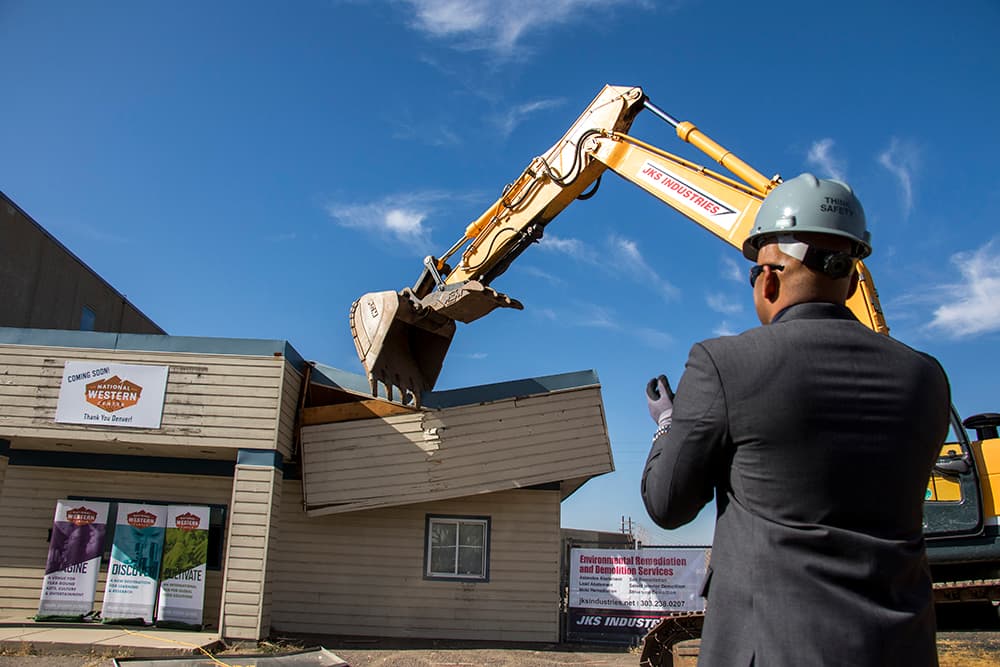
Update: Denver City Council approved the contract extension in a block vote Nov. 27.
A plan to create an Office of Public-Private Partnerships is moving forward with a notable change that lets Denver City Council have the final say on whether the city enters into deals with private partners on major infrastructure and facilities projects.
But Councilman Paul López still has concerns about whether local workers and local companies will benefit if the city goes down this path.
Mayor Michael Hancock is considering creating an Office of Public-Private Partnerships or Office of P3 to attract, vet and shepherd deals related to major city projects, such as the redevelopment of the National Western Center redevelopment and the Denver Center for the Performing Arts.
P3s are an increasingly popular way to pay for public projects for which there is limited funding. CDOT used a P3 to expand U.S. 36 and will use one on the I-70 widening. Denver International Airport is using a P3 for its main terminal renovation. Of course, the private party is only at the table because there's money to be made -- from collecting tolls in the case of highway projects or a share of concessions revenue in the case of the airport.
That means public entities need to proceed carefully to make sure they're making a good deal for taxpayers. In a case that is infamous in municipal government circles, Chicago signed over parking meter revenue in exchange for a much-needed cash infusion but ended up having to pay damages for normal operations that reduced parking meter use, like closing a street for a festival or adding a bike lane. City officials say they would never enter into a deal like that and one benefit of having an Office of P3 is that Denver would have the expertise in-house to closely analyze potential partnerships.
However, some City Council members raised red flags earlier this year because the proposal called for council members to approve the broad framework for future deals but not the actual contracts themselves. Their caution led the mayor's office to change its approach and promise that City Council will always get to approve final contracts.
Councilwoman At-large Robin Kniech called this "a significant change" and a "significant milestone."
With those changes, a council committee voted 4-2 this week to move forward a contract extension with consultant Arup to further develop the plan. That contract extension, which still needs full council approval, had been delayed for several months while council members asked for more information. A proposal is expected in early 2018, and the 2018 budget includes $2.5 million in contingency funds to get the office up and running. Denver City Council will need to vote separately on the appropriation of those funds to start the work of the office.
Some council members still have concerns about how much accountability this office will have and how much control council is ceding.
Councilman Kevin Flynn, one of the no votes, said he's concerned having an office dedicated to public-private partnerships will bias the city's selection process toward these deals, whether they make sense or not for a particular project.
"Does it put a thumb on the scale?" he asked. "... If something enters the P3 pipeline, do we end up with blinders on?"
He also wants to know more about how involved council will be along the way.
"I'm very uncomfortable to be asked to approve a framework and then attend a ribbon-cutting three years later," he said.
Emily Hauber, deputy legislative director in the Mayor’s Office, said the purpose of the office will be to determine if a public-private partnership is a good fit for a particular project, not to push such deals for their own sake, and there will be numerous points at which projects can be diverted to the normal procurement processes if they aren't a good fit.
Kniech said it's important not just that council have opportunities for input but that the public have those opportunities as well.
"We need to make sure that public input doesn’t get cut out because it’s a P3," said.
And López, the other no vote, said Denver needs stronger guarantees that women- and minority-owned businesses will get a fair shake, that living wage provisions will be respected and that local companies and workers will get preference in bids and hiring before inviting the private sector to play a larger role in public projects.
Hauber assured council members that any assets built through P3s will still belong to the public, but López said that's just one of his concerns.
"There is money to be made in building the asset," he said. "There is money to be made in pouring the concrete. ... What I’m trying to stress here is the maximization of community benefit."










